
Guide
Mummy, am I pretty? How to encourage body positivity in young children
by Katja Fischer
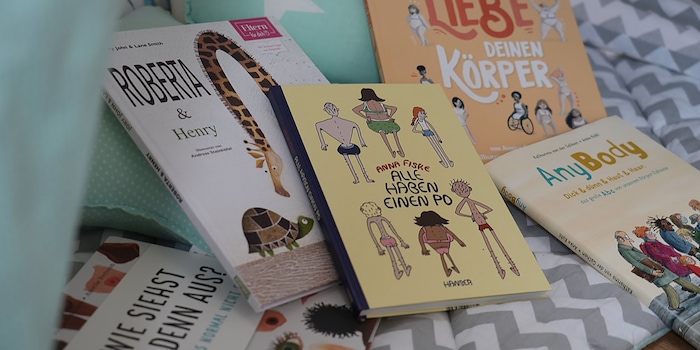
Children's books are an easy way to bring physical diversity into the nursery - and to strengthen a healthy body image at an early age. Five book recommendations.
Am I beautiful? Too fat? Too thin? Too small? Too big? Children don't just ask themselves these questions when they are first presented with supposedly perfect bodies on social media. Ideas about a "good" or "beautiful" body are already formed in early childhood, said Anja Meier, Head of Politics & Media at the foundation Pro Juventute, in a recent article on the topic. That's why it's never too early to promote a positive body image. She explained how parents can do this using specific examples and tips.
Children's books are one option. Parents can use the selection of media content to demonstrate a variety of body shapes from an early age and show children how they can treat their own bodies with respect. I took a close look at five books with and without my daughters and tell you what you can expect from each book - and which ones will end up on our shelves.
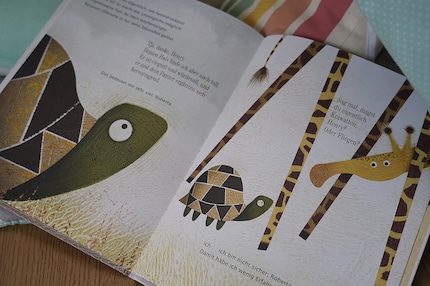
Sometimes giraffe Roberta speaks, sometimes tortoise Henry: the picture book with text alternates between perspectives and dialogues and thus becomes a funny back and forth between the two animals, who couldn't be more different. And yet they have so much in common: Both are unhappy about their necks. Roberta the giraffe thinks hers is too long, too thin and too pied and looks enviously at Henry the tortoise's neck. But he thinks his is just as "pathetic", as he says, "I'm as good as neckless". A friendship develops between the two and both learn to appreciate the peculiarities of their bodies thanks to the other.
Conclusion: A wonderful picture story with lots of humour and strong illustrations that works for even the youngest children.
Age recommendation: from 3 years
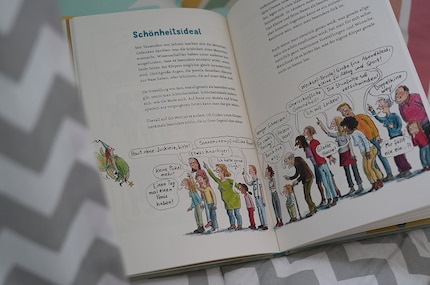
The fact that the book seems confusing at first glance is due to the fact that it is not organised by topic, but alphabetically and is therefore a kind of encyclopaedia. However, the table of contents also bundles the individual terms thematically: for example, according to "What's going on?" (puberty, trans children, changes, etc.), "Body feelings", "Puberty" and "The body".), "Body feelings" (self-doubt, pain, pleasure, etc.) or "How beautiful I am!" (beauty ideals, photos and films, cosmetic surgery, etc.). The illustrations are beautifully designed and make you think and smile in equal measure. Several large extra pictures provide plenty of variety.
Conclusion: Clever and sensitive "lexicon" with lots of information, useful exercises - and numerous eye-catchers, so you'll always discover something new.
Age recommendation: from 8 years
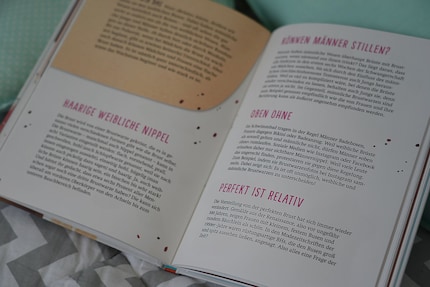
From the eyes to the toes: The book is organised according to 20 different body parts. On two pages each, it shows the differences in colours, shapes and functions, provides knowledge about the respective body part and tells amazing stories and anecdotes about it. Did you know, for example, that you have a "Morton's toe" if your second toe is bigger than your first? That every person walks 180,000 kilometres on their feet in the course of their life? Or that there is a market for do-it-yourself braces in Thailand? The information comes with a relatively large amount of text, but illustrations are rare. The child should therefore be able to read relatively well.
Conclusion: Interesting and informative book with lots of knowledge about body parts. And lots of text - unfortunately at the expense of the pictures.
Age recommendation: from 10 years
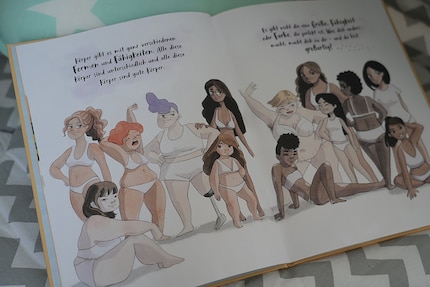
"Every body is different, every body is good" - the book repeats its core message almost like a mantra in its first third. Hang in there! This is soon followed by specific and valuable exercises for more self-love. For example, creating a self-care list, writing down things that support your body, celebrating small things with friends and much more. The reader is also repeatedly encouraged to get help if she doesn't feel better after doing the exercises - the book is primarily aimed at girls. Minus point: Although the illustrations are very lovingly created, they all look blurred and have blur filters. This may be part of the artwork, but in the context of body positivity it rather confuses me.
Conclusion: A successful and encouraging picture book that celebrates all body types. With small and helpful exercises that provide a first introduction to the topic of self-care.
Age recommendation: from 8 years
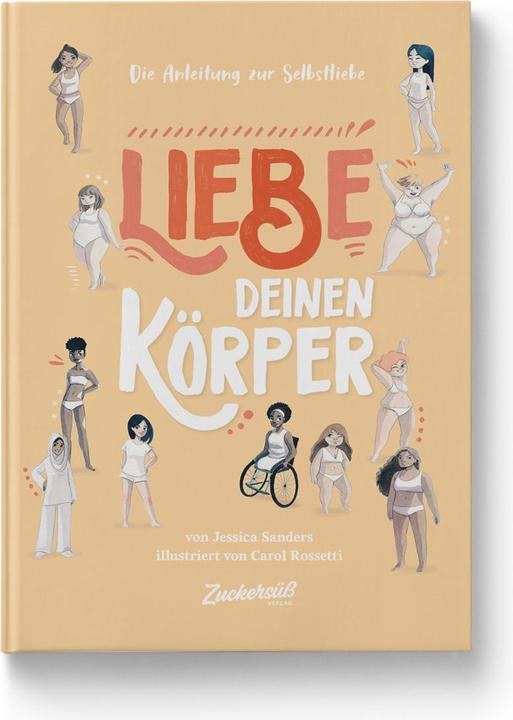
Zuckersüss Die Anleitung zur Selbstliebe: Liebe deinen Körper
German, Carol Rossetti, Jessica Sanders, 2020
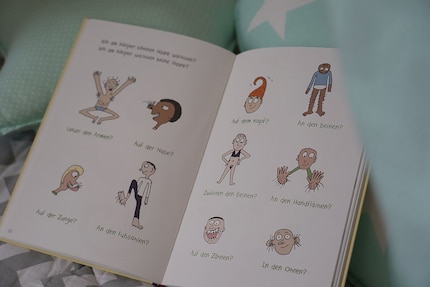
Big, small, old, young, fat, thin, white, black, green: 80 pages are teeming with different bodies. The message: everyone has a bum, everyone has a body, everyone is different. Sometimes you see people peeing, sometimes naked people in the shop or on the bus, sometimes hairy body parts. The picture book pokes fun at human bodies in a funny yet gentle way. Although it only scratches the surface, it provides great entertainment even for small children.
Conclusion: The rich diversity of the human body is impressively demonstrated in numerous pictures. Fun, gentle and easy to understand.
Age recommendation: from 4 years
Do you have any other book recommendations on this topic? Sharing is caring: Share them with us in the comment column!
Cover photo: Katja Fischer
Mom of Anna and Elsa, aperitif expert, group fitness fanatic, aspiring dancer and gossip lover. Often a multitasker and a person who wants it all, sometimes a chocolate chef and queen of the couch.